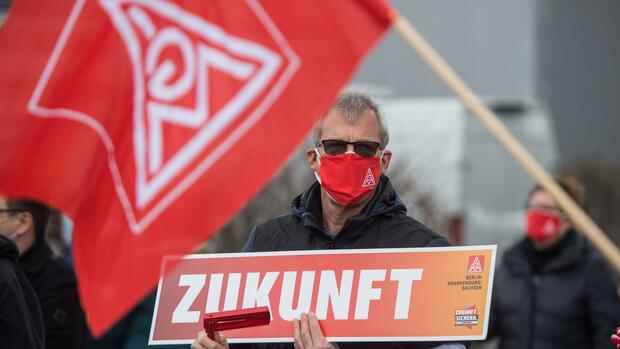Berlin ZF Friedrichshafen looks back on more than a hundred years of history and has reinvented itself over and over again. Initially a manufacturer of gears, the Swabian company developed into one of the leading automotive suppliers in the age of the internal combustion engine.
But there is growing concern among employees at the German locations that the future could take place without them. Because ZF is ramping up the promising e-mobility activities, especially in Serbia, IG Metall boss Jörg Hofmann criticized journalists in Berlin on Thursday.
The Lake Constance group is just one of many companies that are already in the midst of structural change or that are still facing an unprecedented transformation. This applies to other automotive suppliers such as Bosch, Continental or Mahle, who have to make their way into the electric age. This applies to steel manufacturers like Thyssen-Krupp who switch to hydrogen. This applies to the entire chemical industry, which, if it wants to produce in a climate-neutral way, needs as much electricity as the whole of Germany consumes today. Whole regions depend on the industrial jobs that these companies offer – in Saarland, Swabia, in the Ruhr area, in eastern Germany, along the Rhine.
Just last week, the “National Platform for the Future of Mobility” published various reports on the employment effects of the switch to electromobility. According to this, up to 65,000 highly specialized specialists could be needed annually by 2030 to set up a needs-based European battery cell production facility. New jobs are also expected to be created in the production of power electronics and fuel cell vehicles. However, these are not enough to compensate for job losses along the classic drive train.
Top jobs of the day
Find the best jobs now and
be notified by email.
Head of the Union’s workers’ group calls for an “employment pact”
The trade unions are therefore calling for employees not to be left alone in the process of transformation, but rather to offer them new perspectives. Instead of relocating the production of future technologies to low-wage countries, companies should invest in existing locations and make them future-proof.
For this Friday, IG Metall and the industrial union for mining, chemicals and energy (IG BCE) have therefore called for a nationwide day of protest. IG Metall alone is expecting around 50,000 participants, with the largest rally taking place in Stuttgart. “It has to be fair in times of change,” says union boss Hofmann. “And this demands security for the employees and a fair distribution of the burden.”
In the case of SPD chancellor candidate Olaf Scholz, who is negotiating with the Greens and FDP about the formation of a traffic light coalition, the message has already caught on. The change must be actively shaped, he said this week at the IG BCE federal congress. One does not want a “rust belt” in Germany, he emphasized with a view to the region from the state of New York to the Midwest of the USA, which was once dominated by industry.
It is just a shame that this attitude is not reflected in the results of the exploratory talks between the SPD, Greens and FDP, criticized Hofmann. The IG Metall boss has nothing but ridicule for the “Lebenschancen-Bafög”, with which the potential traffic light coalition wants to financially support lifelong training and further education. He calls it “compassionate student aid”.
“It has to be fair in times of change.”
(Photo: IG Metall)
The new chairman of the workers’ group of the Union parliamentary group in the Bundestag, Axel Knoerig (CDU), also considers the traffic light exploratory paper to be far too thin with a view to the challenges of transformation: “We need an employment pact for all sectors that are facing a major transformation”, he said to the Handelsblatt. This applies particularly to the automotive industry.
What the transformation means there, Knoerig can observe in his constituency of Diepholz, where there is a struggle for the future of the ZF locations. “We have to give the workers security by being involved in the restructuring processes,” demands the MEP. Continuing vocational training is an important focus.
IG Metall calls for a renunciation of layoffs during the transformation and a “security promise” for employees affected by the change. This includes providing them with adequate financial support for further training or retraining. Hofmann envisages a benefit in the amount of unemployment benefit I, i.e. at least 60 percent of the net wage. The Qualification Opportunities Act, which currently does not allow the promotion of professional qualifications, must also be expanded.
IG Metall considers additional investments of 500 billion euros to be necessary
However, the union also calls for future-proof new jobs to be located where old jobs are no longer available. State aid funds should in any case be linked to location and employment guarantees.
And last but not least, 500 billion euros in public investments in infrastructure are required over the next ten years. Hofmann would like to involve top earners and the wealthy more in the financing, but the FDP has already drawn a red line for the coalition negotiations when it comes to tax increases.
Nevertheless, the IG Metall boss had a few ideas on how the necessary billions could be mobilized. At the European level, for example, the question of how investment expenditure should be taken into account in the debt rules in the future is currently being discussed. There are also opportunities for indirect state investment.
In any case, the transformation should not only be dumped on the backs of the affected employees, demands Hofmann: “It is a social challenge that arises for all of us.”
More: Interview with IG Metall boss Hofmann: “We are experiencing an immense subsidy competition in Europe”
